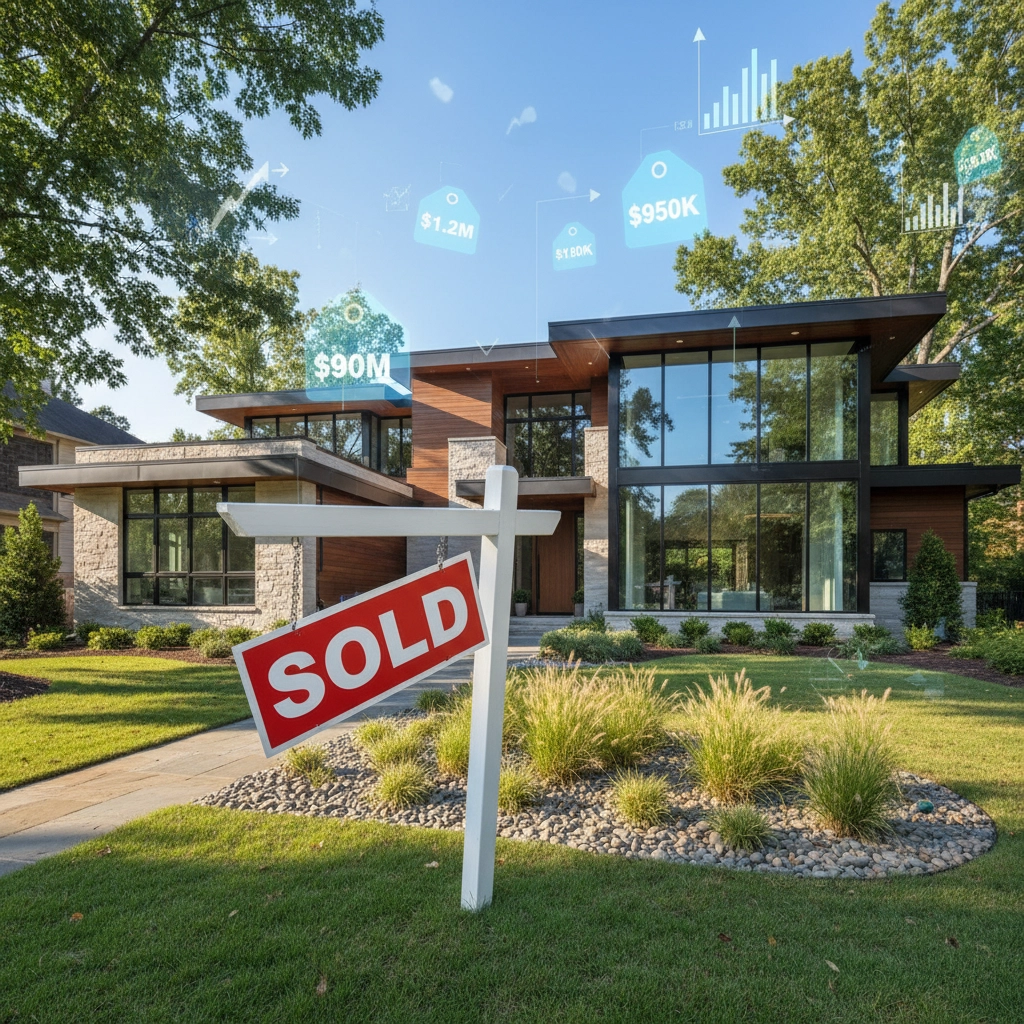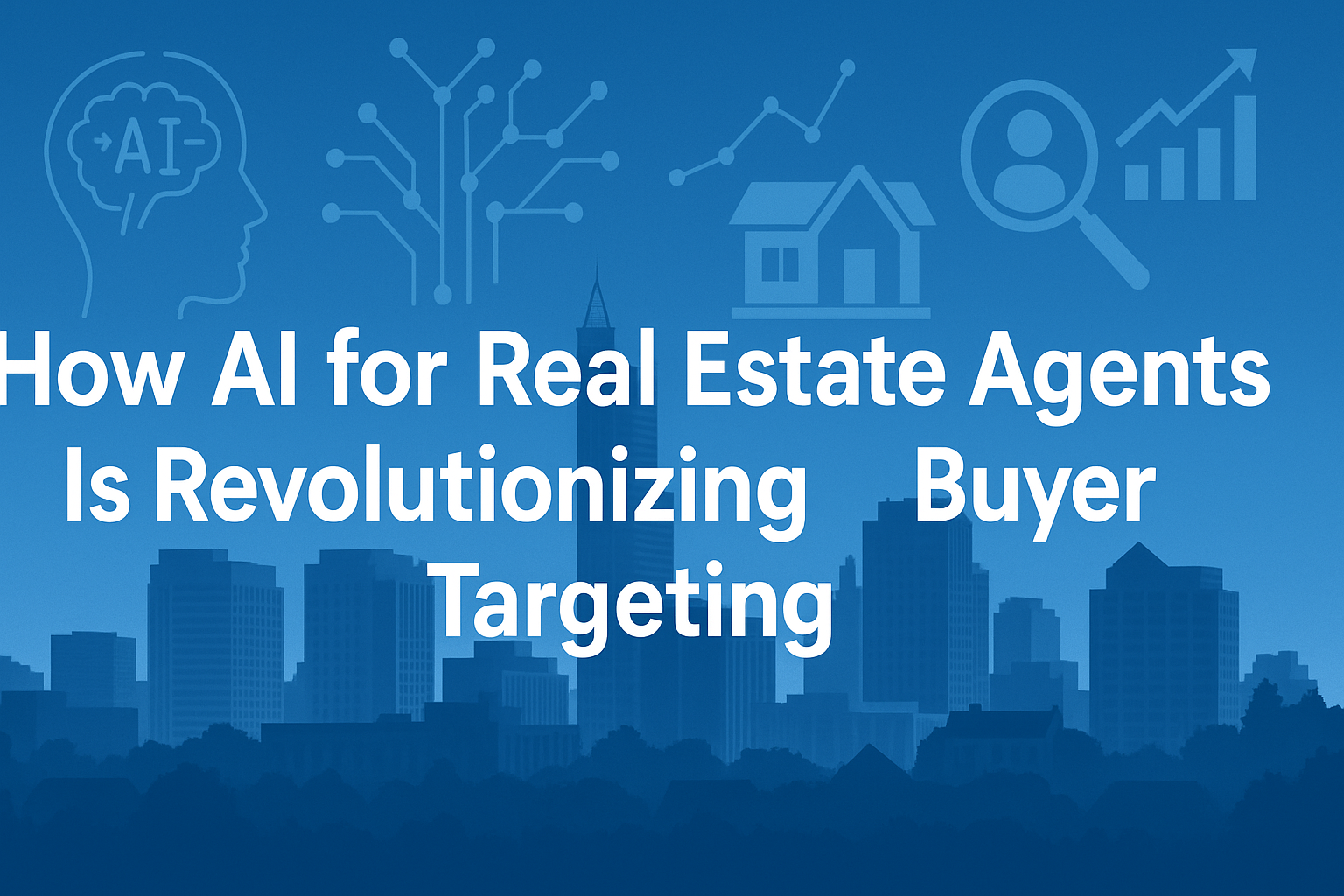The Triangle real estate landscape is changing fast, and AI for real estate agents is driving this shift. From Raleigh to Durham to Chapel Hill, agents are already seeing real results. In fact, AI isn’t just a futuristic concept—it’s here now. It helps homes sell faster and for higher prices. Moreover, it brings precision to pricing and marketing. Whether you’re an agent or a seller, understanding how AI reshapes the Triangle market is essential today.
How AI for Real Estate Agents Is Revolutionizing Buyer Targeting
Gone are the days when agents would simply list a property and hope for the right buyer. Instead, AI brings precision targeting to the table. For many, it feels almost like having a crystal ball. This is especially important in the Triangle, where neighborhoods vary widely. For example, North Hills, Cary, and Apex attract very different types of buyers.
By analyzing massive amounts of data, AI helps match buyers with homes more effectively. These systems review behavior patterns, online searches, and lifestyle preferences. As a result, they create laser-focused matches between homes and buyers.
For Triangle agents, the benefits are clear. Marketing dollars go toward buyers who are most likely to convert. Consequently, showings increase, days on market decrease, and offers become stronger.

One North Hills listing shows the impact. It drew 30+ showings in 48 hours using AI targeting. The home closed $45,000 over list price. The right buyers saw it at the right time. That’s artificial intelligence connecting motivated sellers with serious buyers.
AI goes beyond demographics. It weighs Triangle‑specific factors. Think RTP proximity, school districts, and key amenities. These matter to relocating professionals and growing families.
Smart pricing with AI for real estate agents
Dynamic pricing is a top use case for AI in real estate. CMAs still help, but AI processes thousands of data points in real time. Triangle agents use it for precise pricing. It accounts for seasons and micro‑neighborhood trends.
AI pricing tools scan recent sales, inventory, and buyer activity. They also weigh Research Triangle Park job trends. This helps avoid overpricing and underpricing. Listings stay fresh and profitable.
According to the National Association of Realtors, well‑priced homes sell 87% faster than overpriced ones. AI helps Triangle agents hit that sweet spot.

AI also offers ongoing price optimization. If demand shifts, it suggests smart adjustments before a listing goes stale. This keeps momentum and protects against “price reduction” stigma.
AI for Real Estate Agents: Advanced Marketing Automation
Marketing today spans many platforms. AI marketing platforms for real estate agents automate that work.
These systems build targeted ads on Google, Facebook, Instagram, and more within hours. The AI finds the right demographics for each Triangle neighborhood and home type. It tailors messages to fit each group.
AI-Powered Virtual Tours and Property Showcasing
Virtual tours matter in the Triangle, especially for out-of-state movers. AI creates immersive 3D tours, interactive floor plans, and virtual staging. Buyers can explore before booking a showing. That leads to better-qualified visits and stronger offers.
Properties with AI-enhanced virtual tours receive 40% more engagement, according to Zillow research.
Automated Follow-Up and Lead Nurturing
AI systems excel at maintaining consistent communication with potential buyers throughout their home search journey. For Triangle agents managing multiple listings and dozens of leads, automated follow-up sequences ensure no opportunity falls through the cracks.
These systems can send personalized property recommendations, schedule showing appointments, and even provide market updates tailored to each buyer’s specific interests and timeline. The result is stronger relationships and higher conversion rates from initial inquiry to successful closing.
Market Intelligence and Predictive Analytics
The Triangle Area’s real estate market is influenced by unique factors: from Research Triangle Park expansions to university enrollment changes to seasonal migration patterns. AI analytics tools for real estate agents are providing unprecedented insights into these market dynamics, helping agents make informed decisions and provide valuable guidance to their clients.
These predictive models analyze historical data alongside current market indicators to forecast trends in specific Triangle submarkets. Agents can identify emerging hot spots, anticipate inventory shortages, and adjust their strategies accordingly. This intelligence is particularly valuable for investment buyers and developers looking to capitalize on growth opportunities.

The technology also tracks buyer sentiment and search behavior in real-time. If interest in Cary properties suddenly spikes or Durham searches shift toward specific neighborhoods, agents receive alerts that help them position their listings for maximum exposure and success.
Competitive Market Analysis Enhancement
AI tools are revolutionizing how agents conduct comparative market analyses by processing far more data points than humanly possible. These systems consider factors like property condition, unique features, lot characteristics, and even neighborhood amenities that traditional CMAs might overlook.
For Triangle area properties, this means more accurate valuations that account for local nuances like proximity to greenways, school district boundaries, and commute times to major employment centers. The result is better-informed pricing decisions and more successful sales outcomes.
Cost Savings and Efficiency Gains
Perhaps one of the most compelling benefits of AI for real estate agents is the significant efficiency improvements it delivers. Routine tasks that once consumed hours of an agent’s time: like creating marketing materials, scheduling showings, and following up with leads: can now be automated or streamlined through intelligent systems.
Triangle area agents are reporting time savings of 20-30 hours per week after implementing AI tools, allowing them to focus on high-value activities like client consultation, negotiation, and business development. This efficiency doesn’t just benefit agents; it translates to better service for sellers who receive more attention and expertise throughout the listing process.
The cost savings extend to marketing expenses as well. AI-driven advertising campaigns typically achieve better results at lower costs than traditional marketing methods, as targeting precision reduces wasted ad spend on unqualified audiences.
Looking Forward: The Future of Real Estate in the Triangle
As we look toward the future, it’s clear that artificial intelligence will continue transforming real estate practices throughout the Triangle Area. Emerging technologies like predictive buyer behavior modeling, automated property valuation systems, and enhanced virtual reality experiences are on the horizon.

For sellers in the Triangle market, working with agents who embrace these technologies means faster sales, higher prices, and smoother transactions. The data consistently shows that properties marketed using AI-enhanced strategies outperform traditionally marketed listings across key metrics like days on market, final sale price, and buyer engagement levels.
At Make Your Move Inc., we’re committed to leveraging cutting-edge AI technology to deliver exceptional results for our Triangle area clients. Whether you’re selling a starter home in Garner or a luxury property in North Raleigh, our AI-powered approach ensures your listing reaches the right buyers at the right time with the right message.
The Triangle Area’s real estate market continues evolving, and artificial intelligence is leading that evolution. Agents and sellers who embrace these technological advances are positioning themselves for success in an increasingly competitive marketplace. As Realtor.com research indicates, properties marketed with AI assistance sell an average of 23 days faster than those using traditional methods alone.
The question isn’t whether AI will transform real estate in the Triangle Area: it already has. The question is whether you’re ready to harness its power for your next real estate transaction.

